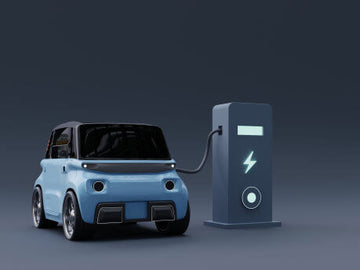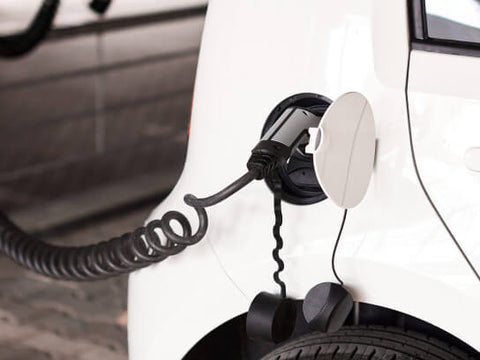
A J1772 charger is a type of electric vehicle (EV) charger commonly used for level 2 charging. It features a standard connector and protocol adopted by most EV manufacturers in North America. Level 2 charging refers to the process of charging an EV using a 240-volt AC electrical circuit, which allows for faster charging compared to standard household outlets.
The J1772 connector is designed to deliver more power to the vehicle, enabling quicker charging times than level 1 charging, which utilizes a standard 120-volt outlet. This type of charger is compatible with various EV models and is commonly found in public charging stations, workplaces, and residential settings equipped with dedicated charging stations. It provides convenience for EV owners by offering faster charging speeds, allowing them to recharge their vehicles more efficiently and effectively. Additionally, many EV manufacturers include a J1772 adapter with their vehicles, allowing them to be easily connected to public charging stations or home charging equipment with a J1772 connector. Overall, the J1772 charger plays a crucial role in facilitating level 2 charging for EVs, contributing to the widespread adoption of electric vehicles and the development of charging infrastructure.
What is a J1772 charger, and how does it relate to level 2 charging?
A J1772 charger is a pivotal component in the realm of electric vehicle (EV) charging, particularly concerning level 2 charging infrastructure. It features a standardized plug and communication protocol, making it compatible with various EV models across North America. Level 2 charging operates on a 240-volt AC electrical circuit, allowing for faster charging rates compared to standard household outlets, which typically provide 120 volts.
The J1772 connector is emblematic of level 2 charging solutions, facilitating rapid energy transfer between the charging station and the vehicle. It is widely deployed in public charging stations, workplaces, and residential settings equipped with dedicated charging infrastructure. With its robust design and interoperability, the J1772 charger ensures seamless compatibility with a diverse range of EVs, offering owners a convenient and efficient means of recharging their vehicles.
Moreover, the J1772 plug is integral to the broader ecosystem of EV charging, supporting multiple levels of charging beyond just level 2. It serves as a versatile connector, enabling compatibility with various charging solutions, including level 1 chargers for standard household outlets and level 3 chargers for DC fast charging. This adaptability underscores the importance of the J1772 charger in facilitating widespread EV adoption and the development of charging infrastructure tailored to meet the diverse needs of EV owners.
Is the Mercedes EQS compatible with J1772 chargers?
The Mercedes EQS is indeed compatible with J1772 chargers, thanks to its versatile charging capabilities. While the EQS primarily utilizes the European Combined Charging System (CCS) plug for rapid DC charging, it also features an onboard adapter for J1772 connectors commonly found in North America. This allows EQS owners to conveniently access level 2 charging infrastructure equipped with J1772 plugs, providing flexibility and convenience during their charging routines.
This compatibility ensures that Mercedes EQS owners can easily recharge their vehicles at a variety of charging stations, including public charging networks, workplaces, and residential settings. By supporting J1772 charging, the EQS exemplifies Mercedes-Benz's commitment to facilitating seamless EV integration and promoting accessibility to charging infrastructure, ultimately enhancing the ownership experience for EV enthusiasts.

How does the charging speed of a J1772 charger compare to other options, such as the fastest home EV charger?
When comparing the charging speed of a J1772 charger to other options like the fastest home EV charger, it's essential to consider their power outputs and compatibility with different vehicles. J1772 chargers typically offer Level 2 charging, providing power levels ranging from 16 to 80 amps, depending on the infrastructure and electrical capacity. While they're widely used and versatile, their charging speeds might not match those of dedicated high-power home chargers.
The fastest home EV chargers, on the other hand, often feature power outputs of 50 amps or higher, allowing for rapid charging rates. These chargers, such as those with NEMA 14-50 plugs or dedicated high-power units like Tesla's Wall Connector, can significantly reduce charging times for compatible EVs. However, their effectiveness depends on factors like the EV's onboard charger capacity and the availability of sufficient electrical infrastructure at home.
Amproad's portable EV chargers offer another flexible solution for EV owners. With adjustable amp ratings up to 40A, they can support efficient charging at home or on the go. While not as powerful as dedicated home chargers, Amproad chargers provide convenient options for overnight charging or emergency situations, ensuring that EV owners can maintain their vehicles' charge levels wherever they are. Ultimately, the choice between J1772 chargers, fastest home EV chargers, or portable solutions like Amproad depends on individual preferences and charging needs.
Are there any special considerations to keep in mind when using a J1772 charger with a Mercedes EQS?
When using a J1772 charger with a Mercedes EQS, there are several special considerations to bear in mind to ensure a smooth charging experience. Firstly, it's crucial to check the compatibility between the J1772 charger and the Mercedes EQS. While J1772 connectors are widely used for Level 2 charging, not all EVs, including the EQS, may be equipped with the necessary adapter or connector. Mercedes EQS owners should verify whether their vehicle supports J1772 charging or if an adapter is required.
Another consideration is the charging speed and power output of the J1772 charger. The Mercedes EQS, like many modern EVs, supports fast charging, but the rate may vary depending on factors such as the charger's power output and the vehicle's onboard charging capabilities. Owners should ensure that the J1772 charger provides sufficient power to meet the EQS's charging needs effectively.
Additionally, Mercedes EQS owners should be mindful of any specific charging protocols or requirements set by the vehicle manufacturer. Some EVs, including the EQS, may have specific charging recommendations or limitations to optimize battery health and performance. Owners should consult the vehicle's manual or manufacturer's guidelines to understand any unique charging considerations for their model.
Moreover, it's essential to ensure the safety and security of the charging process when using a J1772 charger with the Mercedes EQS. This includes verifying the integrity of the charging equipment, ensuring a secure connection between the charger and the vehicle, and monitoring the charging session for any signs of irregularities or malfunctions. By adhering to these special considerations, Mercedes EQS owners can enjoy efficient and hassle-free charging experiences with J1772 chargers.

Can you use a Tesla destination charger with a Mercedes EQS?
Using a Tesla destination charger with a Mercedes EQS might seem plausible at first, given the widespread availability of Tesla charging infrastructure. However, there are compatibility issues to consider. Tesla's destination chargers typically use proprietary connectors designed specifically for Tesla vehicles. As a result, they may not be compatible with non-Tesla EVs like the Mercedes EQS, which typically utilize standard J1772 or CCS charging connectors.
While some Tesla destination chargers may feature adapters or additional connectors to accommodate other EV models, compatibility cannot be guaranteed. Mercedes EQS owners should verify the charging connector compatibility before attempting to use Tesla destination charger. Attempting to force a connection or use incompatible adapters could potentially damage the charger, the vehicle, or both, resulting in costly repairs or safety hazards.
Instead of relying on Tesla destination chargers, Mercedes EQS owners should seek out charging stations equipped with J1772 or CCS connectors, which are standard across a wide range of EV models, including the EQS. Many public charging networks offer a mix of connector types to accommodate various EVs, providing convenient options for charging while on the go. Additionally, Mercedes-Benz dealerships and service centers may also offer charging facilities compatible with the EQS, ensuring reliable and safe charging experiences for owners.
What are the benefits of using a J1772 charger for home charging?
Using a J1772 charger for home charging offers several benefits for electric vehicle (EV) owners. One advantage is compatibility with a wide range of EV models, including popular brands like Tesla, Nissan, Chevrolet, and BMW. The standardized J1772 connector ensures that most EVs can easily connect to the charger, providing convenience and flexibility for homeowners with multiple electric vehicles or those considering future EV purchases.
Another benefit is the reliability and safety of J1772 charging equipment. J1772 chargers are designed to meet strict safety standards, providing peace of mind to EV owners concerned about electrical hazards or equipment malfunctions. Additionally, many J1772 chargers feature built-in safety features such as overcurrent protection, ground fault detection, and automatic shutoff mechanisms to prevent accidents and protect both the vehicle and the charging infrastructure.
Furthermore, J1772 chargers are often more affordable and easier to install compared to other home charging options. Many electric utilities offer rebates or incentives for purchasing and installing J1772 charging stations, helping offset the initial investment costs for homeowners. Additionally, J1772 chargers can be easily integrated into existing electrical systems, making them a practical choice for residential charging solutions.
Overall, the benefits of using a J1772 charger for home charging include compatibility with a wide range of EVs, reliability and safety features, and affordability. For homeowners looking to transition to electric vehicles or enhance their EV charging capabilities, installing a J1772 charging station offers a convenient and efficient solution for charging at home.
Where can you find J1772 charging stations for public use?
J1772 charging stations for public use are becoming increasingly prevalent, making it easier for electric vehicle (EV) owners to charge their vehicles on the go. These stations can be found in various locations, including shopping centers, grocery stores, restaurants, office buildings, and public parking lots. Additionally, many municipalities are installing J1772 charging stations in public spaces such as parks, libraries, and city centers to support the growing number of EVs on the road.
Furthermore, several online resources and mobile apps provide maps and directories of J1772 charging stations, allowing EV owners to easily locate nearby charging options. These platforms often include information about station availability, pricing, and charging speeds, helping drivers plan their routes and ensure they have access to charging facilities when needed. Some EV manufacturers also offer integrated navigation systems that display nearby charging stations, making it even more convenient for drivers to find public charging options while on the road.


